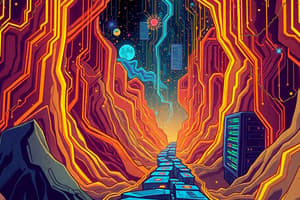Podcast
Questions and Answers
Which statement most accurately describes ACID properties in database systems?
Which statement most accurately describes ACID properties in database systems?
- ACID properties allow for eventual consistency in data.
- ACID encompasses Atomicity, Consistency, Isolation, and Durability. (correct)
- ACID properties ensure data is temporary and can be lost.
- ACID is primarily focused on scalability and availability.
What is a key feature of document-based NoSQL databases?
What is a key feature of document-based NoSQL databases?
- They only support structured data.
- They require a fixed schema and data types.
- They store data in documents and collections. (correct)
- They normalize data across multiple tables.
Which NoSQL database type is primarily designed to handle connected data with relationships?
Which NoSQL database type is primarily designed to handle connected data with relationships?
- Key-value store
- Graph database (correct)
- Column-family database
- Document database
Which of the following correctly represents the BASE properties associated with NoSQL systems?
Which of the following correctly represents the BASE properties associated with NoSQL systems?
In the context of NoSQL databases, what distinguishes key-value stores from document databases?
In the context of NoSQL databases, what distinguishes key-value stores from document databases?
What is the effect of the command 'db.collection_name.find()'?
What is the effect of the command 'db.collection_name.find()'?
Which method is used to insert a single record into a MongoDB collection?
Which method is used to insert a single record into a MongoDB collection?
If you want to update multiple records in a collection, which command would you use?
If you want to update multiple records in a collection, which command would you use?
What syntax correctly deletes a single record from a collection?
What syntax correctly deletes a single record from a collection?
When using the find() method with a specific field, how do you specify the fields to return?
When using the find() method with a specific field, how do you specify the fields to return?
What function does the '$set' operator have in an update command?
What function does the '$set' operator have in an update command?
Which command would you use to view existing databases in MongoDB?
Which command would you use to view existing databases in MongoDB?
Which method would you use to retrieve specific records where a field matches a value?
Which method would you use to retrieve specific records where a field matches a value?
Flashcards
NoSQL Database
NoSQL Database
A family of non-relational databases that don't rely on a primary-secondary key relationship model.
NoSQL BASE properties
NoSQL BASE properties
Basically Available, Soft state, Eventually Consistent – properties of NoSQL systems emphasizing availability, flexibility, and eventual data consistency over strict ACID-like guarantees.
Document Database
Document Database
Stores data in documents and collections, allowing all data about a single object to be stored in one document.
Key-Value Database
Key-Value Database
Signup and view all the flashcards
Column-family Database
Column-family Database
Signup and view all the flashcards
MongoDB
MongoDB
Signup and view all the flashcards
Collection (MongoDB)
Collection (MongoDB)
Signup and view all the flashcards
Mongo Shell
Mongo Shell
Signup and view all the flashcards
CRUD Operations (MongoDB)
CRUD Operations (MongoDB)
Signup and view all the flashcards
find() Method (MongoDB)
find() Method (MongoDB)
Signup and view all the flashcards
insertOne() Method (MongoDB)
insertOne() Method (MongoDB)
Signup and view all the flashcards
updateOne() Method (MongoDB)
updateOne() Method (MongoDB)
Signup and view all the flashcards
deleteOne() Method (MongoDB)
deleteOne() Method (MongoDB)
Signup and view all the flashcards
Study Notes
NoSQL Overview
- NoSQL is a family of non-relational databases
- Non-relational databases do not rely on primary-secondary key relationships
- This contrasts with SQL databases
NoSQL Advantages
- Handles unstructured data storage
- Provides scalability (ability to handle increasing data volumes by adding more servers)
- Offers high availability (functions continuously without interruption)
- Enables fast development (supports agile environments requiring constant feedback and fast iterations)
- Enables management for large amounts of unstructured data
ACID vs BASE
- ACID properties are used in Relational Databases (SQL)
- Atomicity - Transactions occur as a whole (all or nothing)
- Consistency - Data remains consistent across all users
- Isolation - Transactions do not affect each other
- Durability - Data is persistent even during failures
- BASE properties are used in Non-Relational Databases (NoSQL)
- Basically Available - Opposite of Isolation
- Soft state - Data may be in intermediate states
- Eventually consistent - Data eventually becomes consistent
NoSQL Types
- Document (stores data in documents and collections)
- Key-value (stores data in key-value pairs)
- Column-family (stores data in columns indexed by rows)
- Graph (stores data in nodes connected by relationships)
Document Databases (Example: MongoDB)
- Stores data in documents and collections
- Enables storing all data about one object in a single document/collection (eliminating the need to separate into multiple parts)
Key-Value Databases
- Stores data as key-value pairs
- Intermediate storage type between SQL and Document databases
Column-Family Databases
- Stores data in columns
- Allows different kinds of data to be stored in various rows (flexible)
Graph Databases
- Stores data in connected nodes
- Useful for representing relationships and connections between data points
Use Cases for Different NoSQL Types
- Use a document database for social media or content management systems.
- Use a key-value database for caching or simple data storage.
- Use a column-family database for storing data with varying row structures
- Use a graph databases for relationships in social networks
MongoDB CRUD Operations
- CRUD stands for Create, Read, Update, Delete
- find() - Used to retrieve documents fulfilling specified criteria
- insertOne() - Used to insert a single document
- insertMany()- Used to insert multiple documents
- updateOne() - Used to update a matching document
- updateMany() - Used to update multiple matching documents
- deleteOne()- Used to delete a document
- deleteMany()- Used to delete multiple documents
MongoDB Commands
- show dbs — Displays available databases
- use database_name — Selects a specific database
- show collections — Displays collections in a database
Studying That Suits You
Use AI to generate personalized quizzes and flashcards to suit your learning preferences.




